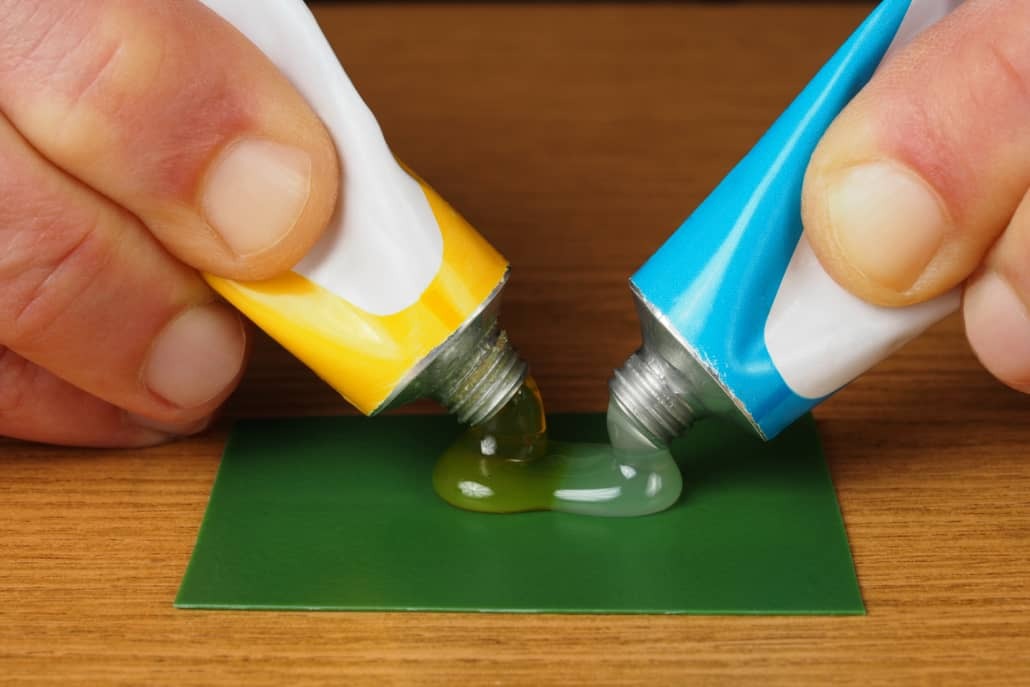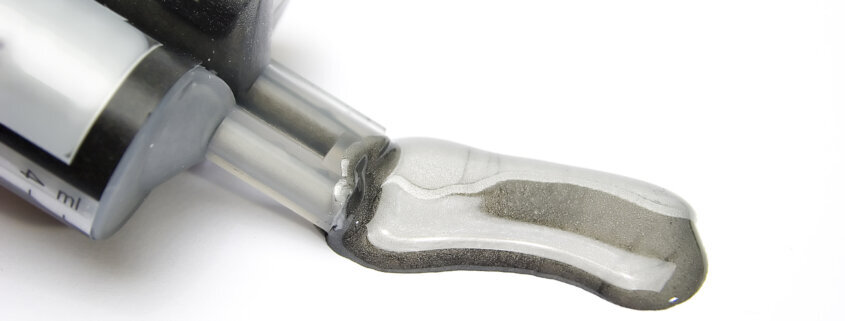Epoxy adhesives
Epoxy adhesive – the most used industrial adhesive
Epoxy adhesives are by far the most common industrial adhesives and probably the most versatile structural adhesives. The popularity of epoxy adhesive is not the least due to the extreme toughness of the cured product nor their incredible ability to adhere to a wide range of materials. Epoxy resin adhesive systems are also easy to modify to make them meet the unique property needs of every individual project.
Epoxy adhesives are realized using different epoxy adhesive resin types which define the fundamental properties of the adhesive. The most suitable and strongest epoxy for specific application is usually determined by looking at the resin: a heat proof epoxy resin is the best when high temperature resistance is required where as a flexible epoxy resin is the go to solution when movement may be involved. Here yoy can find the general benefits of epoxy resin adhesives as well as the most common epoxy resin types and some epoxy adhesive applications.
What is so special about epoxy adhesives?
The presence of epoxy groups in the chemical formulations of the adhesives grants them several advantages. Epoxy resin adhesive can be modified and given desired properties rather easily, but all epoxy adhesives share some characteristics including:
- Chemical resistance: generally, all epoxy resins resist chemical exposure better than most alternatives. With modification epoxy adhesives can even withstand total immersion in harsh chemicals.
- Heat resistance: due to the chemical composition of epoxy, the adhesives are heat resistant by nature. Also a property that can be enhanced by modifying the formulation. Usually, epoxy adhesives are heat resistant up to 200°C (390°F). However, also heat proof epoxy resin types exist which withstand even higher temperatures.
- Durability and final strength: once cured, the epoxy bonds are among the strongest in industrial applications: they even hold the truck lift world record using adhesive, having lifted a 17, 500 kilogram truck. They also retain stability over a long period of time. Industrial epoxy adhesive systems that use various resins are among the strongest epoxy systems.
- Electrical properties: one of the desired properties of epoxy resin adhesive is its excellent electrical insulation which makes it suitable for applications like printed circuit boards.
- Watertightness: probably the most well known property of epoxy adhesives. Not only do they create strong bonds, but also effectively seal and make joints and gaps watertight.
1 compoonent and 2K epoxy resin adhesive
Epoxy adhesives exist in one and two component glue systems, which both form extremely strong bonds, but differ from each other by curing process and final properties as well as applications. 2K epoxy resin adhesive is generally tougher than single component systems.
2K epoxy glue

The two component epoxy resin adhesives are greater in versatility, as they are used in all market segments. They are slightly more complex to process, as the two components, resin and catalyst, must be mixed with each other, and the worklife is limited from a few minutes to a couple of hours depending on the industrial epoxy adhesive formulations. These 2K epoxy resin adhesives cure in ambient temperature, but the process can be sped up by applying heat or an external source of energy such as UV light depending on the formulation. Generally, the epoxy adhesives cure to the toughest bonds when the curing period has been the longest.
The major advantage of 2K epoxy glue solutions is that they adhere to almost any surface including wood, metals, plastics, ceramics and various types of rubber. They also are resistant to physical and chemical influences including heat resistance to 95° to 200°C (200°F to 390°F).
Single component epoxy glues
One component epoxy resin adhesives are easy to process as they do not require mixing unlike 2K epoxy glue. They usually have a paste-like consistency which makes them ideal for application by trowel or extrusion by beads. These adhesives cure in elevated temperature between 120° and 175°C (250° and 350°F) depending on the formulation. The single component heat cure adhesive systems fill and seal gaps efficiently, particularly between metal surfaces.
One part epoxy adhesives also appear in a form of heat curing film adhesive. The film adhesives are the best applied on large areas for bonding or laminating purposes. These films are found for example in the aerospace industry in assembly compounds. The one part epoxy resins adhesives are also common as construction epoxy adhesive which can be applied for instance when laying tiles.
5 common types of epoxy resin adhesive
Epoxy glue is not simply just one and two component adhesives, but many formulations exist depending on the resin, catalyst, modifiers and additives. The most important ingredient that gives the system most of its properties is the epoxy adhesive resin. It is also possible to use a combination of resins in order to guarantee the best possible solution. Here we will take a closer look at the five most common epoxy resins used in adhesives. In case you require any additional information on these or other types of epoxies, contact us and let us find the solution that benefits your application the most.
1. DGEBA epoxy resin
Diglycidyl ether of bisphenol A (BPA), better known as DGEBA epoxy, is the oldest epoxy resin, and by far the most important in epoxy adhesive formulations, not the least due to its relatively low cost of raw materials. Additionally, this resin is compatible with a wide range of catalysts allowing for a broad selection of properties to be created. The industrial epoxy adhesive systems using DGEBA epoxy, cure either in room temperature or with additional heat.
DGEBA epoxy resin exists as low molecular weight liquids, high molecular weight semi solids and solids as well as brominated resins. The latter are used primarily for application requiring ignition resistance. Therefore, brominated resins are common for example in circuit boards and other applications where flame retardance is needed.
2. Epoxy novolac adhesives
Epoxy novolac adhesives are best known as the most chemical resistant and high temperature resistant epoxies. They also have better adhesion than the BPA epoxies. In order to develop these properties to their best, the epoxy novolac must be cured in a high temperature. When cured in room temperature, the properties that can be achieved are similar to the ones of DGEBA epoxy adhesives. The length cycle of the curing process significantly affects the thermal stability of the cured bond.
Epoxy novolac resins are generally complex to process due to their high viscosity. Low viscosity alternatives have recently been developed in order to ease the processing. However, these products tend to have lower epoxy resin content. Whatever the case, epopxy novolac is almost predominantly a 2K epoxy glue.
3. Flexible epoxy resin glues
Epoxy glues and adhesives are generally not known for their flexibility. However, long chain aliphatic epoxy resins make it possible to add flexibility to the properties of epoxy adhesives. Nevertheless, the addition of this flexible epoxy resin compromises on toughness of the glue. Therefore, flexible epoxy resins are generally not used alone but rather mixed as modifiers with other epoxies to create a tougher and stronger yet flexible solution. When the resin content comprises of aliphatic epoxy for 10-30%, a required level of flexibility can be achieved without remarkably influencing other properties. These are the best flexible epoxy adhesive systems.
Flexible epoxy resin adhesives are used for instance for laminating safety glass, dampening vibration and sound as well as encapsulating electrical components and other delicate components that require thermal cycling.
4. Waterborne epoxy adhesives
By nature, epoxies are hydrophobic, thus not dispersible in water. Water dispersibility can, nonetheless, be conveyed to epoxies in two ways: chemical modification or emulsification. The latter is primarily used for resins in waterborne epoxy adhesives and done by separating the water from the resin with a surfactant. The choice of the surfactant and processing parameters determine the mechanical and chemical stability of the adhesive.
5. Epoxy acrylate resins
When formulating adhesives, two types of epoxy acrylate resins are used: vinyl ester and a special resin for radiation curing. These resins act more like polyester resins despite of being epoxies. They are easy to process, cure fast at room temperature and can use peroxides as the curing agent. In adhesives, these epoxy resins create lower viscosity, more flexibility and better wetting characteristics than conventional DEGBA epoxies. However, they do shrink more than any other epoxy adhesive while curing.
The epoxy acrylate resins can also be cured by radiation from an external source of energy such ultraviolet (UV) or electron beam (EB). These epoxy resin adhesives are generally low in viscosity and high in vapor pressure.
Examples of epoxy adhesive applications
As epoxy glue is a versatile product that exists as many formulations, the uses of the different types are nearly endless. Here below you can find some examples of tepoxy adhesive applications.
- Chemical and biochemical industry: due to its outstanding chemical resistance, epoxy adhesives are common in applications that involve harsh chemicals. Especially epoxy novolac based formulations are used in tanks and other means to store chemicals.
- Automotive industry: the strength of epoxy is also needed in the automotive industry where adhesives are replacing conventional fasteners and welded bonds, as they are remarkably lighter in weight. Also flexible epoxy resin glue is common for damping sound and vibration.
- Aerospace: the aerospace industry uses epoxy adhesives as one component films and 2K epoxy glue systems for various applications. For example helicopter rotor baldes are bonded with epoxy glues due to the adhesives´ extreme strength and mechanical stability.
- Marine: as epoxies form watertight bonds and are resistant to salt water, they are ideal for marine environments.
- Construction: epoxy adhesive is also used in construction for example for repairing floors and tiles. The adhesives are resistant against the elements and therefore, suitable also for outdoor applications. Next to being an industrial adhesive, construction epoxy adhesive is also popular among DIYers.
Tip: for what ever you are using epoxy adhesive, research shows that proper storage of the glue can remarkably improve efficiency.
Find the epoxy adhesive that is a perfect match to your project
As we have now discovered, epoxy glue is not simply one type of adhesive, but covers a wide variety of formulations which all have their advantages. In case you are looking for the best possible industrial epoxy adhesive for your project, contact us and let our experts connect you with the most suitable epoxy resin adhesive.



